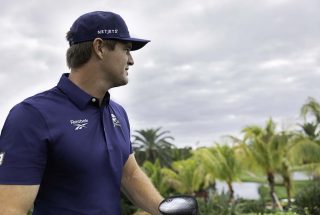African-American ownership and a thriving youth program of more than 300 show inclusion to women, millennials and minorities.
Lawrence, Kan. (Feb. 28, 2017) – Sage Ware is a ninth grader who resides on the outskirts of Washington, D.C.
She had never been exposed to golf until she was introduced to the game at Marlton Golf Course, a public venue in Upper Marlboro, Md., owned by four African Americans who are trying to bring more diversity to the game.
“Golf was new to me. I just figured ‘Why not?’ It gives me hope that I can try new things,” said Ware, noting that it is neat to take her swings on a golf course and pretty cool that there is a clubhouse that offers food. “A lot of kids are enthusiastic about it,” she told Howard Richman, associate editor for GCM, the official publication of the Golf Course Superintendents Association of America (GCSAA).
A lot of adults, including Marlton Golf Course superintendent Brian Judd, hope that the enthusiasm behind Ware’s endorsement will sweep the country.
The effort to grow and diversify golf, both for participants and future industry professionals, remains an ongoing challenge. Statistics indicate that golfer participation among non-Caucasians has decreased in three consecutive years of studies.
However, Judd, a 53-year-old GCSAA member, is trying to do something about it – as are Marlton’s four owners: Willie Blakeney Jr., Vann B. Jones, Jimmy Garvin and Henry C. Turner Jr., who purchased the golf course in 2015.
“What it means to the four of us is that we have a great responsibility to be successful and to bring in minorities to experience golf,” Turner said. “When my wife and I were in the military in the 1990s, we were looking for some land in Mississippi. A realtor took us to a neighborhood that had a nice golf course. He said, ‘No, you won’t end up here, not on this golf course.’ Really, he was telling me point-blank we’re black, and we wouldn’t step foot on that golf course.”
Fast-forward 20 years to two years ago when Turner, who was interested in business land development, received a call about 162 acres, featuring a golf course, in Marlton, Md. Immediately, he called Jones and Blakeney. They teamed up to purchase Marlton Golf Course, later adding Garvin as co-owner and general manager.
“It had always been in the back of my mind what happened all those years before. I may not have been able to get on that golf course in Mississippi in 1995, but now I own my own golf course less than 15 minutes from the nation’s capital,” Turner said.
Although they welcome people of any race and color to their facility, African-American youths are a cornerstone of Marlton’s charge. Craig Kirby’s non-profit organization “Golf. My Future. My Game.” uses Marlton as a vehicle to make golf affordable and accessible to women, millennials and certainly young African Americans such as Ware.
And, along the way, Judd hopes that they may uncover a future superintendent.
“If I can get some kids interested in this job, what a future we have. What’s wrong with that?” Judd said.
People such as Sondra Williams and her four-year-old granddaughter Kylie represent Marlton’s vision. Williams signed up as a volunteer for “Golf. My Future. My Game.” and Kirby’s dedication to it cemented her belief in the cause.
“I’ve seen Craig’s commitment, his enthusiasm. They are reaching young people of color and showing them about the game, this world, early on. A sense of inclusion, belonging, is happening there,” says Williams, noting that Kylie won’t come to the driving range unless she is guaranteed a chance to hit balls. “It is taking these kids on a different journey, things that translate to all aspects of their lives, like conducting yourself in a kind, courteous manner. Plus, they are learning a demanding game that causes you to step up.”
At Marlton, Kirby enrolls about 80 youths in his 12-week classes. They learn how to putt, what goes on in the pro shop and how to tackle soil erosion. And the fact that the facility is owned by African Americans is critical.
“To be able to bring them to a place where the owners look like them is really powerful. It takes away the intimidation. To be able to give them a level of comfort and see that these people who look like them care about their growth is wonderful,” said Kirby, adding that more than 300 youths have participated.
Like Kirby, Marlton and the entire golf industry continue to pursue inclusion and diversity, and it doesn’t hurt to have Everett Pearson on their side. In Maryland, they know him as Reverend Everett Pearson. The pastor at Mount Calvary Catholic Church, Pearson has members who belong to “Golf. My Future. My Game.” He approves of what they are preaching there.
“I’ve seen the kids’ smiles, those big, toothy grins,” Pearson said. “What they are doing there is a great idea. They are showing that anything is possible if you put your heart and soul into it.”
Note: For a complete look at the Marlton Golf Course story, click here to read Howard Richman’s engaging feature in the March edition of GCM: http://gcmdigital.gcsaa.org/i/792030-mar-2017/60.
About GCSAA and the EIFG
The Golf Course Superintendents Association of America (GCSAA) is a leading golf organization in the United States. Its focus is on golf course management, and since 1926 GCSAA has been the top professional association for the men and women who manage golf courses in the U.S. and worldwide. From its headquarters in Lawrence, Kan., the association provides education, information and representation to nearly 18,000 members in more than 78 countries. The association’s mission is to serve its members, advance their profession and enhance the enjoyment, growth and vitality of the game of golf. Visit GCSAA at www.gcsaa.org or find us on Facebook or Twitter.
The Environmental Institute for Golf is the philanthropic organization of the GCSAA. Its mission is to foster sustainability through research, awareness, education, programs and scholarships for the benefit of golf course management professionals, golf facilities and the game. Visit EIFG at www.eifg.org. or find us on Facebook or Twitter.
Contact:
Craig Smith, Director, Communications and Media Relations
Phone: 800-472-7878, ext. 4431 or 785-691-9197 (cell)
csmith@gcsaa.org



